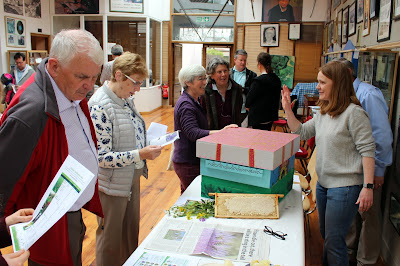Kilcullen Pollinator Project in full flight
Part of the Kilcullen Tidy Towns/KCA Programme for 2019 and beyond, the initiative led by local beekeeper Paul Leighton provided a fascinating insight into the importance of bees to our everyday life, and even to the future of the planet.
“If the bees aren’t here, will we not be here too?” The question from a child at the launch presentation was blunt, as children’s questions on such issues can be, untainted by political obfuscation.
“We will be,” Paul reassured her. “But we wouldn’t have as much to eat. Or as many different things.”
That set the tone for half an hour or so of his presentation, because it was significant that most of the questions asked in the Town Hall Theatre were from children. That may be a lesson for those of us in the present and passing generations. The future is for the children. And they are worried.
 |
| Paul explains a detail of bee activity to Ray Kelly. |
The Kilcullen Pollinator Project highlights the importance of the Native Brown Irish Honey Bee. Partly because it is the focus of Paul Leighton’s personal passion, and partly because Ireland is the only place in Europe where this particular kind of bee is still primary.
“We are in the position where we could be reintroducing this bee to Europe,” he told those at the launch, but with the caveat that neither Ireland or the EU have any regulatory policies about the spread of non-native bees.
A variety of pollinator insects are crucial to the life cycle of crops, and the Native Brown Irish Honey Bee is part of Ireland’s heritage, he said. He outlined the challenges it faces — the impact of environmental changes and habitat destruction, ‘hybridisation’ and competition through the importation of non-native bees which also bring in parasites, and the negative effects of pesticide and chemicals use in gardens and agriculture.
On the positive side he illustrated the Kilcullen project supported by KCA, how the new community beehives — one bought, one constructed by local carpenter Jason Aspell — had been decorated by Scoil Bhride pupils.
He detailed the various stages of the development of the hives as bee colonies, one already at work, in a secure local location.
Paul’s presentation included information on the benefits of honey to human health, as well as that of other useful byproducts from honey production. The enjoyment he gets personally from beekeeping was clear, but he also counselled those interested to be sure to do a beekeeping course with one of the local associations before plunging into doing it themselves.
Undoubtedly the most important advice of the morning was about what we can all do to help bees and other pollinators continue their critical role in maintaining the planet Earth as a viable place for humankind.
Planting pollinator-friendly flowers, shrubs, and trees are part of that. A small but very useful idea is to retain part of home gardens unmown, allowing growth of grasses and wildflowers which nourish bees and other life.
The work of Kilcullen Tidy Towns/KCA in this was also noted, including allowing grass verges on approaches and in estates to grow wild until now so that pollinator-friendly ‘weeds’ like dandelions are available to foraging bees.
Paul showed a map centred in Kilcullen which illustrated the 3km range of bees from the new community hives in Kilcullen. It takes in a very large area of the town’s hinterland.
The plan for the project includes growing a second hive colony to an ability to survive next winter. Schools and other groups are also invited to visit the hives, by appointment, This will encourage full community involvement and other local beekeeping initiatives.
By next summer, the project is expected to be producing a significant amount of honey which will be sold in aid of local charities.
Paul Leighton hopes that Kilcullen’s lead will become a model for other communities to imitate.
The launch event concluded with a group visit to the community hive location to observe the bees in action.
This is National Biodiversity Week. Kilcullen is doing its bit.
(This article was updated to correct Jason Aspell's surname, which had been inadvertently reported as Doyle.)
Photographs use Policy — Privacy Policy





































